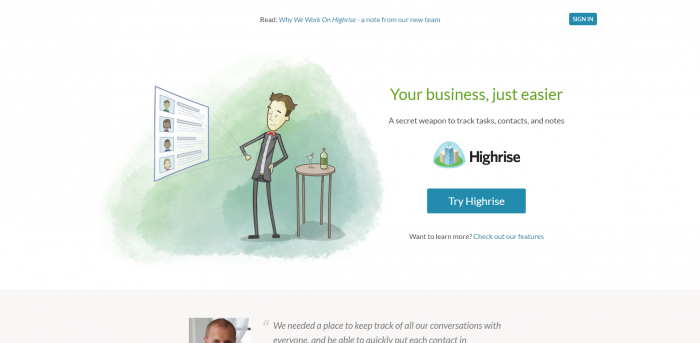Over the last decade, the Cloud has transformed the costs and capabilities of customer relationship management (CRM) tools. Users can now update and access contacts and sales data anywhere, whether in the office or at an impromptu meeting a hundred miles away. These systems promise an easy setup, decreased cost, and third-party integrations for many of the apps you’re already using. The following six fill a variety of sales-oriented needs while helping users prioritize customer satisfaction.

You might already be familiar with the company behind Highrise. Basecamp released their CRM system in 2007, but they’ve been making web apps since 1999. Highrise’s interface emphasizes team communication, providing task tracking and reminders as well as email capabilities and contact management. Blinklist calls Highrise a “viable option” for those who may not need the “typical full range of CRM functionality,” while CRMCog warns that Highrise may be “too simple,” and users in need of customization features should steer clear.
Integrations: Highrise supports 96 third-party app integrations, including Tracks, MailChimp, Zapier, and Wufoo.
Pricing: Highrise presents users with a 30-day free trial for any of the three tiers: Basic ($24/month), Plus ($49/month), and Premium ($99/month).
HubSpot has been around since 2006. This company’s CRM system focuses on cutting down on a user’s “tool time,” or minutes lost logging and managing data, in order to increase time spent selling. Another significant principle that went into making the software is ensuring that salespeople have customer information available in its totality when they need it. The system features a customizable “deal and task board,” simplified contact communication, and a database of potential leads. The Sales Lion classifies HubSpot CRM as “a lighter-weight CRM tool that offers some really cool features which enhance the power of the HubSpot platform,” but notes that the comparative depth of other CRM platforms may not merit a switch if your company is already using another system.
Integrations: HubSpot CRM integrates with the company’s other platforms, HubSpot Sales and Marketing (both paid services). There are 49 additional third-party apps to choose from, with the most popular including Zendesk, FreshBooks, and HelloSign. HubSpot is also developer-friendly, allowing for developers to build their own third-party integrations.
Pricing: HubSpot is free, with options for paid premium features.
Pipedrive was made “by sales pros, for sales pros” and released in 2010. As a result of its creators’ history of sales experience, Pipedrive caters to the issues that typically hold sales professionals back. The “Pipeline” dashboard provides users with a data overview, “Timeline View” assists in prioritizing, and charts visually aggregate sales data and progress. Merchant Maverick points out that most of Pipedrive users complaints are related to the system’s mobile app, but nevertheless praising the platform’s application across a spectrum of business models.
Integrations: Pipedrive allows for 43 total integrations, with the notable inclusion of two-way syncing Google Apps. Other third-party options include Yesware, MailChimp, Zapier, and PandaDoc.
Pricing: Pipedrive has just one plan, which costs $12/user/month. There’s also a free trial for customers looking to test out the service before committing.
Founded in 1999 and headquartered in San Francisco, Salesforce is the company more or less responsible for creating cloud-based CRM software. Salesforce operates on a philanthropic model that donates 1% of its resources to “giving back” through employee volunteering, community grants, and more. As far as its CRM features go, the service hones in on sales administration, personalized customer service, brand marketing for all channels (email, social media, etc.), employee communication, and analytics for customer info. Automation is also important to Salesforce, as a slew of integrations allow users to centralize information taken from a variety of compatible platforms. Salesforce’s aggregate rating on G2 Crowd is 4.1 out of 5 stars (978 ratings). The most helpful review labels Salesforce “the leading CRM platform for sales and service,” praising ease of administration and complex analytics but raising the concern that Salesforce may be rolling out too many products at once, stretching company resources too thin.
Integrations: Salesforce provides 2,973 total integrations through its business app store, AppExchange. Offerings are split into categories like Sales (which has the most to choose from), Customer Service, IT & Administration, Marketing, Finance, and Collaboration. The most popular downloads include Data Loader, MailChimp, DocuSign, Gmail, and Microsoft Outlook.
Pricing: There are four plans to choose from, with Starter beginning at $25/user/month and the highest-priced Unlimited setting you back $250/user/month. There’s also the $300/user/month Performance Edition Bundle, which has a $600 value.
Sugar was founded in 2004, and its system is known for its open-source availability. Users can still download the community edition for free, although it is no longer being updated alongside the paid version. Sugar operates on principles of automation and customization intended to simplify the customer’s life. Features include activity streams (complete with social media integration), advanced charts, alerts and other productivity aids, case management, sales activity and opportunity tracking, campaign and email marketing, and more. Zapier highlights the helpfulness of the system’s customization offerings in both paid and Community Edition forms.
Integrations: Sugar offers 179 different third-party app integration options, such as MailChimp, Freshdesk, and Relationship Analytics.
Pricing: Sugar provides users with a selection of three plans: Professional ($40/user/month), Enterprise ($65/user/month), and Ultimate ($150/user/month). As for alternate options, the open-source community edition is still available in its earlier form (Sugar markets it as “a good way for developers to get to know Sugar”), and there’s a free trial as well.
Zoho’s CRM system came on the scene in 2005, though the company has been offering SAAS since 1996 (previously as AdventNet Inc.). System features include “turning looks into leads” by importing site visitor data, smart prioritization through the View for Activities option, sales activity tracking, social media integration, customer data compilation through Business Card View, and more. Small Business Trends warns that Zoho can be “tricky” for first-time CRM users, but concludes that the system is “a great value for the price“.
Integrations: With Zoho, users have the option of integrating roughly 70 different apps and add-ons. Options include Twitter, Facebook, Google Apps, Evernote, MailChimp, WordPress, and more.
Pricing: Zoho offers a free plan with limited features, as well as a 15-day free trial for paid versions. The three paid tiers—Standard, Professional, and Enterprise—clock in at $12/user/month, $20/user/month, and $25/user/month respectively.
By Leo Welder





